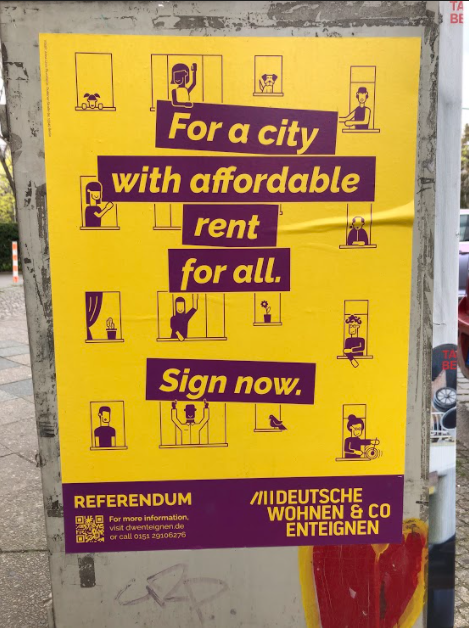On 15 April last year – six months into nationwide lockdown – I woke up to the news that Berlin’s hard-won rent cap was overturned in a court ruling through some political loophole found by Christian Democratic Union lawyers, Germany’s center-right political party.
This news hit a city under strain.
In April 2021, the unemployment rate hovered at 10.5 percent, myself – a grad student taking service industry jobs alongside my studies – among them. I frantically began calculating the back payments that I would now be required to produce. More than 85 percent of Berlin’s population are renters, and stories quickly emerged of tenants who would have to repay them as soon as the next day. There had been whispers that this court decision would be coming, but the harshness of doing so in the midst of a pandemic felt like a stark contrast from anything I’d experienced in Berlin since moving here six years prior.
During my first summer in the city, I wrote an article, “Berlin Dreams: The land of opportunity in a changing world” about how Berlin felt like a place of possibility, a reprieve from the cruel and relentless neoliberal policies of my home country. Upon arriving here it felt as if it were still possible to pursue one’s passions rather than racing on a hamster wheel just to make ends meet.
This was a dream worth defending, and perhaps for the first time, I stopped feeling like a wayward expat with shallow roots in a city known for its transience.
That evening, I attended a demonstration – one mixed with Germans and foreigners alike – where thousands gathered in solidarity against the ruling.
The Right to the City

It turns out that I was far from the only expat to feel this way. The post, “Who Owns Berlin?” – published by the popular expat magazine Exberliner – resurfaced and recirculated widely. Additionally, the push to expropriate Berlin’s big landlords taken up by the movement, DW & co. Enteignen!, rapidly gained momentum as it put together a petition to hold a referendum for the city of Berlin to buy back thousands of apartments from real estate speculators during the September elections.
Over the following months, the city was plastered with the organization’s trademark yellow and purple posters, published with information in nearly a dozen languages, which speaks to the fact that nearly a third of Berlin’s residents have foreign roots. There was even an English wing of the movement established, Right to the City, so that more expats could get involved.
By the end of June, the group had received 350,000 signatures in favor of holding the referendum, double the required number necessary for getting a referendum on the election ballot.
The movement also opened important conversations about voting rights in Berlin, as more than a fifth of adult residents are not allowed to vote due to foreign status. This was the first time I witnessed German organizers acknowledging our shared stakes and making efforts to include foreigners in solidarity over decisions made about our city.
Despite the inability of such a large portion of the population to vote, the September referendum won in a historic landslide, thanks to popular support. It was a victory to inspire the world over.
What the future holds
You may have heard that Germany elected its first new chancellor in 16 years, but on a municipal level Berlin has also experienced the changing of hands, as the controversial new mayor, Franziska Giffey was voted in and began her term at the very end of last year.
Dwelling at the more conservative end of her center-left party, Social Democratic Party, she is known for not supporting the referendum and many are holding their breath as to whether she will see it through. While she technically must honor the decision, it has been reported that she will soften the law in favor of the housing companies and delay its implementation.
Nonetheless, 2022 is the year to watch out for in terms of what becomes of this groundbreaking decision.
With the start of a new year, our city is poised on the brink of uncertainty. But Berlin’s reputation as the land of opportunity hasn’t exactly faltered. What’s changed is that more and more people are asking, land of opportunity for whom? Bigwig real estate investors and mega corporations like Amazon and Google, or the people arriving with ideas, ready to put their dreams into motion?
Of one thing I am certain: I stand with my fellow Berliners in claiming our right to this city – the creatives, the misfits, the artists, musicians, and filmmakers, the startups changing the ways we work for the better – we will continue to fight for the right to our city.

About the author:
Lily Cichanowicz is an American freelance writer and journalist currently based in Berlin. In the form of cultural analysis, her writing is a critical exploration of everything from the personal to the political, and her aim is to share the insights she has with readers.
On her website, you can find a curated selection of her favorite pieces.
You can read more of her Dispatches posts here.














